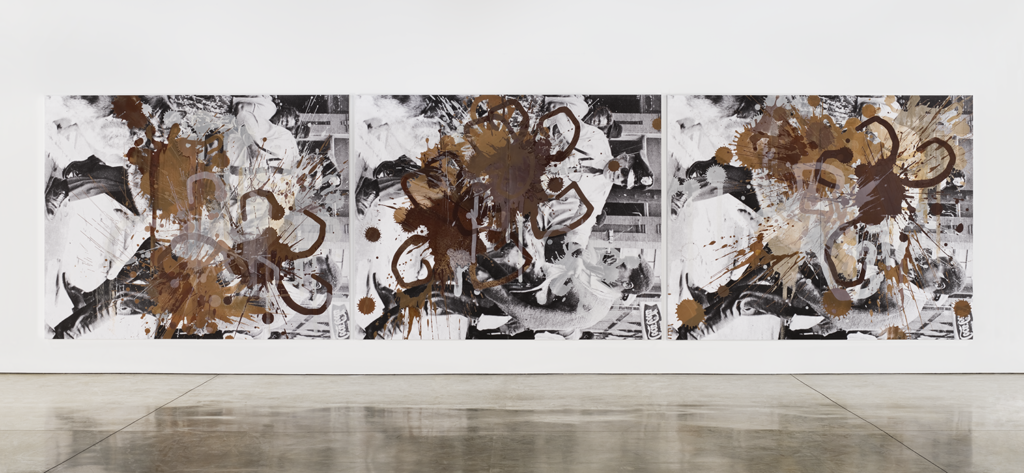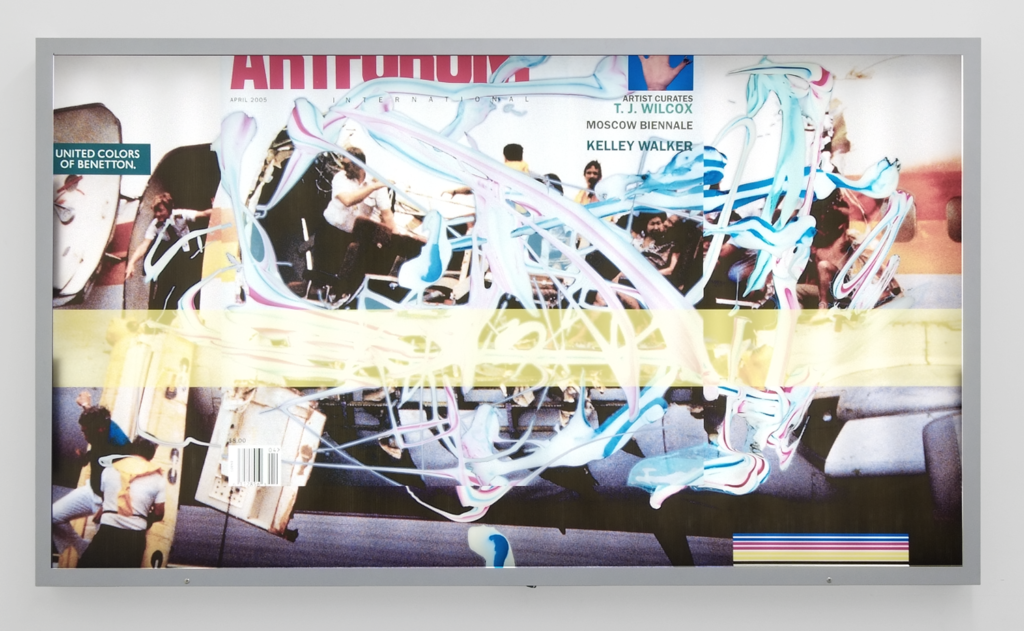Art & Exhibitions
Stung by Critics, St. Louis Museum Will Modify Controversial Exhibition
Kelley Walker's images of police brutality are overlaid with images of smeared chocolate and toothpaste.

Kelley Walker's images of police brutality are overlaid with images of smeared chocolate and toothpaste.

Brian Boucher

After coming under fire for racial insensitivity, the Contemporary Art Museum St. Louis plans to modify Kelley Walker’s latest exhibition, rather than remove it from view.
“Kelley Walker: Direct Drive” (September 16–December 31) depicts images of police brutality, overlaid with images of smeared chocolate and toothpaste. Tempers flared after a September 17 talk by the artist, who is white. Some audience members confronted the artist about the meaning of the works and felt they were met with hostility and condescension.
Three museum staffers wrote an open letter to museum director Lisa Melandri, stating that the museum’s display of the works aligned the institution with the injustice they see in repeated police killings of African Americans. The show opened two years after the fatal police shooting of unarmed black teenager Michael Brown in nearby Ferguson.

Kelley Walker, Untitled, 2006. Marieluise Hessel Collection, Hessel Museum of Art, Center for Curatorial Studies, Bard College, Annandale-on-Hudson, New York.
The works currently confront visitors as they enter the institution; soon, museumgoers will be greeted by signage informing them of the fracas that the show inspired. The museum is making the layout changes in concert with the artist, a representative informed artnet News.

Kelley Walker, Untitled, 2015. Courtesy the artist; Paula Cooper Gallery, New York; Thomas Dane Gallery, London; and Galerie Gisela Capitain, Cologne.
The museum director and the artist have issued apologies, and the wall represents a further concession to protesters, some of whom called for a boycott of the museum; for the removal of the works in question; and for the resignation of the chief curator, Jeffrey Uslip, who organized the show.
A statement from the museum, supplied to artnet News on Monday, follows:
For the past week, the Contemporary Art Museum St. Louis (CAM) has engaged in a necessary and meaningful dialogue with the community about the exhibition Kelley Walker: Direct Drive, the controversial artist’s talk regarding the exhibition, and the concerns regarding racial insensitivity both the show and the talk have generated.
First and foremost, CAM would like to reiterate our apology to the community for the anger and pain we caused. Our mission as an institution is to be a place where all can experience contemporary art in a space free from discrimination, judgment, and disrespect. It is clear, from the community’s response to Kelley Walker’s artist’s talk on September 17, that we failed to provide a place where all voices could be heard.
Throughout our dialogue with community activists and leaders, we have listened to their requests to remove Kelley Walker: Direct Drive from the museum. In accordance with CAM’s steadfast commitment to free speech and freedom of expression, we have concluded, after lengthy and thoughtful deliberations, to keep the exhibition on view. Taking down the show would violate the Museum’s core principles and end the productive dialogue that this work has initiated. CAM has a history of showing controversial artists; we have shown works that have challenged common sensibilities and presented work that has critiqued, in a difficult way, misogyny, patriarchy, homophobia, and the military industrial complex, among other issues. Despite the debates and discomfort these exhibitions generated, we never removed them.
We must, however, note that the deep community concern surrounding Kelley Walker: Direct Drive is different and deserves a different response. The show will remain on view in its entirety, but with modifications designed to welcome dialogue and dissent. Additionally, the museum will explore further ways to engage the community in an ongoing and constructive dialogue on the issues the exhibition has raised. Finally, CAM will ensure that the exhibit is properly identified as potentially painful, so that visitors who wish to avoid particularly difficult works may do so.
Learning and engagement are at the very core of CAM’s values. From this experience – from the voices raised within the community – we ourselves have learned. With these modifications and with ongoing discussions, we will maintain our commitment to meaningfully engage with the public through art.